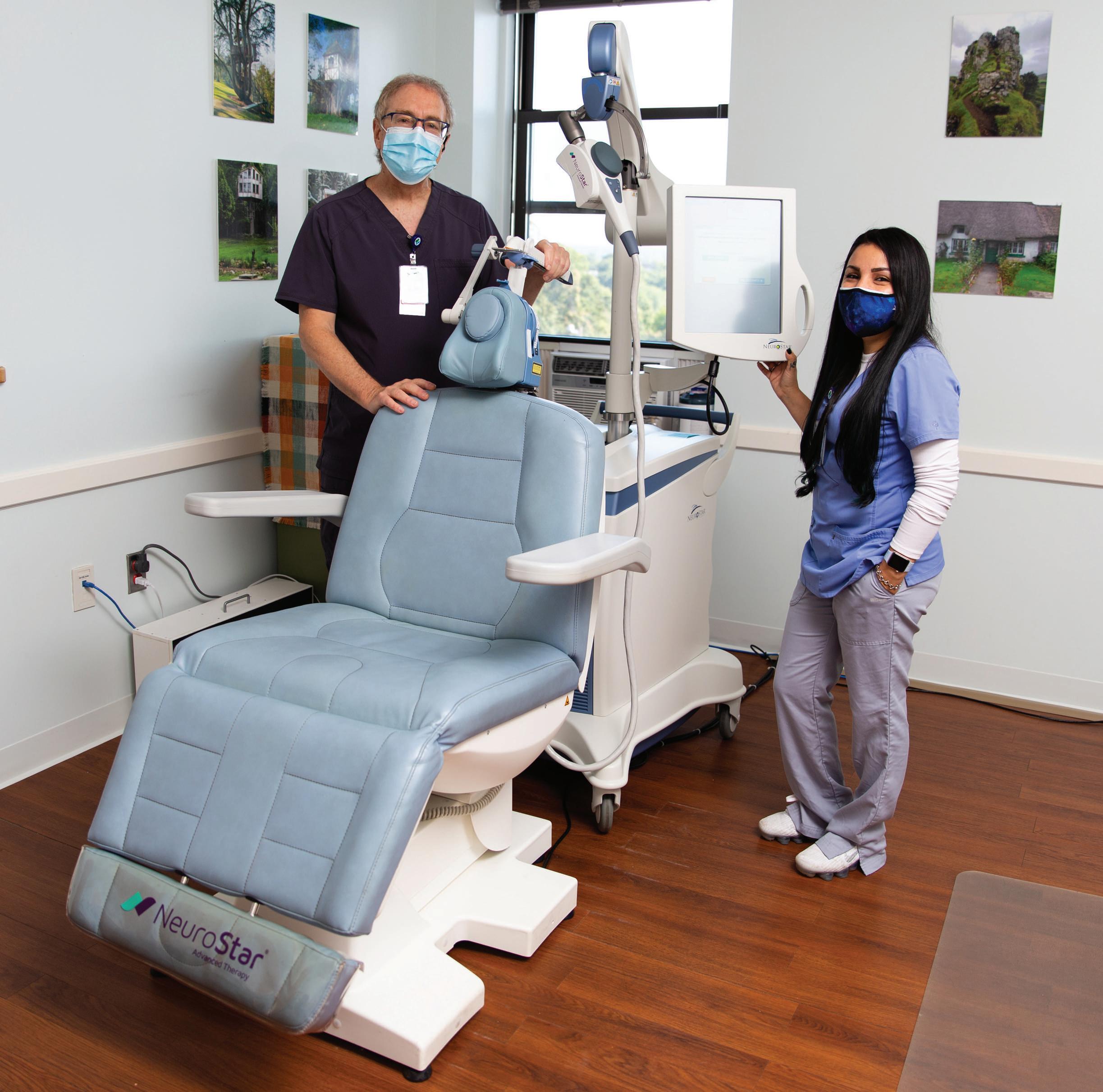
4 minute read
NEW HOPE FOR DEPRESSION Tedd Ackerman, MD, answers questions about transcranial magnet stimulation.
Tedd Ackerman, MD, Medical Director of Behavioral Health at HMC, and Lori Goshea, TMS Coordinator, with transcranial magnet stimulation (TMS) equipment.
NEW HOPE FOR DEPRESSION
TEDD ACKERMAN, MD, ANSWERS QUESTIONS ABOUT TRANSCRANIAL MAGNETIC STIMULATION (TMS), A NONINVASIVE, DRUG-FREE WAY TO TREAT DEPRESSION
FOR MANY PEOPLE living with depression, medication and psychotherapy may not be enough to alleviate debilitating symptoms. Some can’t tolerate the side effects of drugs, and others find they don’t help. Tedd Ackerman, MD, Medical Director of Behavioral Health at Holyoke Medical Center, was excited when a new development in psychiatry offered hope for major depressive disorder. He began offering transcranial magnetic stimulation (TMS) to patients in 2017. Since then, Dr. Ackerman has treated hundreds of people with TMS. Sixty-six percent reported an improved quality of life, and 33% said symptoms were gone completely. Here, Dr. Ackerman answers common questions about the treatment.
HOW DOES TMS WORK?
During a TMS treatment, an electromagnet delivers targeted magnetic pulses that stimulate cortical regions in the left prefrontal cortex of the brain, an area of the brain involved in regulation of mood and depression. This area is known to be underactive in people who suffer from depression. Research studies with PET scans show that there are changes in brain activity not only in the left prefrontal cortex but in other connected areas of the brain not being directly stimulated.
WHAT DOES A TMS TREATMENT INVOLVE?
TMS therapy is a noninvasive treatment requiring 36 sessions of 20 to 30 minutes, five days a week for six weeks. During treatment, the patient reclines in a comfortable chair, and a small electromagnetic coil is placed against the scalp near the forehead. The electromagnet delivers a pulse that stimulates nerve cells in the region of the brain that controls mood. Patients feel a mild tapping sensation with periods of rest in between for a total of 3,000 pulses. Treatment is administered by an experienced TMS technician under the supervision of the TMS physician or by the TMS physician.
Tedd Ackerman, MD IS TMS SAFE?
FDA-cleared to treat depression since 2008, TMS has a proven track record for providing a safe, effective way for patients to achieve relief from depression. TMS does not require surgery or implantation of electrodes. And, unlike electroconvulsive therapy (ECT), TMS doesn’t cause seizures or require sedation with anesthesia. TMS doesn’t have any of the side effects associated with traditional antidepressant medications.
DO TMS TREATMENTS HURT?
TMS is generally well-tolerated, and very few patients drop out of treatment. At Holyoke Medical Center, we do everything we can to ensure our patients are comfortable during treatment. This may include changing the parameters of treatment or alternating where the magnetic coil is placed.
WHAT ARE THE SIDE EFFECTS?
Side effects are generally mild and may include superficial scalp pain at the site of treatment and occasional headache. Both side effects are temporary and can be alleviated with Tylenol or ibuprofen.
WHAT HAPPENS AFTER A TREATMENT SESSION?
After a treatment session, patients can immediately return to their normal routine, including driving.
HOW SOON WILL I SEE RESULTS?
Some patients experience positive mood changes within a few sessions, with many seeing changes after 20 treatments. To get the full effect, patients should complete the entire treatment plan.
CAN I HAVE TMS AGAIN?
Some patients who undergo TMS have long-lasting results and remain free of symptoms. However, some patients do relapse. If treatment with TMS was effective the first time, it likely will be again. We also have found that medications that were not previously effective may be more helpful after TMS treatment.
WILL MY INSURANCE COVER TMS TREATMENT?
Massachusetts insurance plans cover TMS when criteria are met. You may have a copay for each treatment.
IS THERE ANYONE WHO SHOULD NOT HAVE TMS?
People with implanted metallic hardware in the brain, such as aneurysm clips, or implanted electrical devices, such as pacemakers or cochlear implants, are not candidates for TMS.
IS TMS RIGHT FOR ME?
TMS may be a good choice if you suffer from depression that has not responded to traditional treatments, or if you can’t tolerate the side effects of antidepressant medications. My typical patients have failed a minimum of two to four medications. They’re frustrated, trying medications endlessly with diminishing returns. I’m pleased that Holyoke Medical Center offers another treatment option. Our staff will work with each patient’s medical provider to see if TMS is an appropriate and safe choice.
SCAN BELOW
To learn whether TMS might be right for you, take our quiz by scanning this QR code.

✱To learn more about transcranial magnet stimulation (TMS) or to make an appointment for a consultation with our board-certified psychiatrists, call 413.535.4930. To learn more, visit www.holyokehealth.com/TMS.






